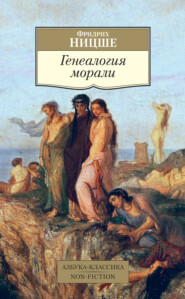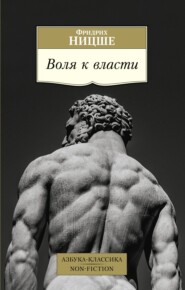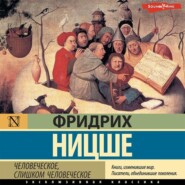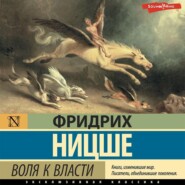По всем вопросам обращайтесь на: info@litportal.ru
(©) 2003-2024.
✖
Human, All-Too-Human: A Book For Free Spirits; Part II
Настройки чтения
Размер шрифта
Высота строк
Поля
135
Poet and Reality. – The Muse of the poet who is not in love with reality will not be reality, and will bear him children with hollow eyes and all too tender bones.
136
Means and End. – In art the end does not justify the means, but holy means can justify the end.
137
The Worst Readers. – The worst readers are those who act like plundering soldiers. They take out some things that they might use, cover the rest with filth and confusion, and blaspheme about the whole.
138
Signs of a Good Writer. – Good writers have two things in common: they prefer being understood to being admired, and they do not write for the critical and over-shrewd reader.
139
The Mixed Species. – The mixed species in art bear witness to their authors' distrust of their own strength. They seek auxiliary powers, advocates, hiding-places – such is the case with the poet who calls in philosophy, the musician who calls in the drama, and the thinker who calls in rhetoric to his aid.
140
Shutting One's Mouth. – When his book opens its mouth, the author must shut his.
141
Badges of Rank. – All poets and men of letters who are in love with the superlative want to do more than they can.
142
Cold Books. – The deep thinker reckons on readers who feel with him the happiness that lies in deep thinking. Hence a book that looks cold and sober, if seen in the right light, may seem bathed in the sunshine of spiritual cheerfulness and become a genuine soul-comforter.
143
A Knack of the Slow-Witted. – The slow-witted thinker generally allies himself with loquacity and ceremoniousness. By the former he thinks he is gaining mobility and fluency, by the latter he gives his peculiarity the appearance of being a result of free will and artistic purpose, with a view to dignity, which needs slow movement.
144
Le Style Baroque.[11 - In German Barockstil, i. e. the degenerate post-Renaissance style in art and literature, which spread from Italy in the seventeenth century. – Tr.]– He who as thinker and writer is not born or trained to dialectic and the consecutive arrangement of ideas, will unconsciously turn to the rhetoric and dramatic forms. For, after all, his object is to make himself understood and to carry the day by force, and he is indifferent whether, as shepherd, he honestly guides to himself the hearts of his fellow-men, or, as robber, he captures them by surprise. This is true of the plastic arts as of music: where the feeling of insufficient dialectic or a deficiency in expression or narration, together with an urgent, over-powerful impulse to form, gives birth to that species of style known as “baroque.” Only the ill-educated and the arrogant will at once find a depreciatory force in this word. The baroque style always arises at the time of decay of a great art, when the demands of art in classical expression have become too great. It is a natural phenomenon which will be observed with melancholy – for it is a forerunner of the night – but at the same time with admiration for its peculiar compensatory arts of expression and narration. To this style belongs already a choice of material and subjects of the highest dramatic tension, at which the heart trembles even when there is no art, because heaven and hell are all too near the emotions: then, the oratory of strong passion and gestures, of ugly sublimity, of great masses, in fact of absolute quantity per se (as is shown in Michael Angelo, the father or grandfather of the Italian baroque stylists): the lights of dusk, illumination and conflagration playing upon those strongly moulded forms: ever-new ventures in means and aims, strongly underscored by artists for artists, while the layman must fancy he sees an unconscious overflowing of all the horns of plenty of an original nature-art: all these characteristics that constitute the greatness of that style are neither possible nor permitted in the earlier ante-classical and classical periods of a branch of art. Such luxuries hang long on the tree like forbidden fruit. Just now, when music is passing into this last phase, we may learn to know the phenomenon of the baroque style in peculiar splendour, and, by comparison, find much that is instructive for earlier ages. For from Greek times onward there has often been a baroque style, in poetry, oratory, prose writing, sculpture, and, as is well known, in architecture. This style, though wanting in the highest nobility, – the nobility of an innocent, unconscious, triumphant perfection, – has nevertheless given pleasure to many of the best and most serious minds of their time. Hence, as aforesaid, it is presumptuous to depreciate it without reserve, however happy we may feel because our taste for it has not made us insensible to the purer and greater style.
145
The Value of Honest Books. – Honest books make the reader honest, at least by exciting his hatred and aversion, which otherwise cunning cleverness knows so well how to conceal. Against a book, however, we let ourselves go, however restrained we may be in our relations with men.
146
How Art makes Partisans. – Individual fine passages, an exciting general tenor, a moving and absorbing finale – so much of a work of art is accessible even to most laymen. In an art period when it is desired to win over the great majority of the laymen to the side of the artists and to make a party perhaps for the very preservation of art, the creative artist will do well to offer nothing more than the above. Then he will not be a squanderer of his strength, in spheres where no one is grateful to him. For to perform the remaining functions, the imitation of Nature in her organic development and growth, would in that case be like sowing seeds in water.
147
Becoming Great to the Detriment of History. – Every later master who leads the taste of art-lovers into his channel unconsciously gives rise to a selection and revaluation of the older masters and their works. Whatever in them is conformable and akin to him, and anticipates and foreshadows him, appears henceforth as the only important element in them and their works – a fruit in which a great error usually lies hidden like a worm.
148
How an Epoch becomes Lured to Art. – If we teach people by all the enchantments of artists and thinkers to feel reverence for their defects, their intellectual poverty, their absurd infatuations and passions (as it is quite possible to do); if we show them only the lofty side of crime and folly, only the touching and appealing element in weakness and flabbiness and blind devotion (that too has often enough been done): – we have employed the means for inspiring even an unphilosophical and inartistic age with an ecstatic love of philosophy and art (especially of thinkers and artists as personalities) and, in the worst case, perhaps with the only means of defending the existence of such tender and fragile beings.
149
Criticism and Joy. – Criticism, one-sided and unjust as well as intelligent criticism, gives so much pleasure to him who exercises it that the world is indebted to every work and every action that inspires much criticism and many critics. For criticism draws after it a glittering train of joyousness, wit, self-admiration, pride, instruction, designs of improvement. – The God of joy created the bad and the mediocre for the same reason that he created the good.
150
Beyond his Limits. – When an artist wants to be more than an artist – for example, the moral awakener of his people – he at last falls in love, as a punishment, with a monster of moral substance. The Muse laughs, for, though a kind-hearted Goddess, she can also be malignant from jealousy. Milton and Klopstock are cases in point.
151
A Glass Eye. – The tendency of a talent towards moral subjects, characters, motives, towards the “beautiful soul” of the work of art, is often only a glass eye put on by the artist who lacks a beautiful soul. It may result, though rarely, that his eye finally becomes living Nature, if indeed it be Nature with a somewhat troubled look. But the ordinary result is that the whole world thinks it sees Nature where there is only cold glass.
152
Writing and Desire for Victory. – Writing should always indicate a victory, indeed a conquest of oneself which must be communicated to others for their behoof. There are, however, dyspeptic authors who only write when they cannot digest something, or when something has remained stuck in their teeth. Through their anger they try unconsciously to disgust the reader too, and to exercise violence upon him – that is, they desire victory, but victory over others.
153
A Good Book Needs Time. – Every good book tastes bitter when it first comes out, for it has the defect of newness. Moreover, it suffers damage from its living author, if he is well known and much talked about. For all the world is accustomed to confuse the author with his work. Whatever of profundity, sweetness, and brilliance the work may contain must be developed as the years go by, under the care of growing, then old, and lastly traditional reverence. Many hours must pass, many a spider must have woven its web about the book. A book is made better by good readers and clearer by good opponents.
154
Extravagance as an Artistic Means. – Artists well understand the idea of using extravagance as an artistic means in order to convey an impression of wealth. This is one of those innocent wiles of soul-seduction that the artist must know, for in his world, which has only appearance in view, the means to appearance need not necessarily be genuine.
155
The Hidden Barrel-Organ. – Genius, by virtue of its more ample drapery, knows better than talent how to hide its barrel-organ. Yet after all it too can only play its seven old pieces over and over again.
156
The Name on the Title-Page. – It is now a matter of custom and almost of duty for the author's name to appear on the book, and this is a main cause of the fact that books have so little influence. If they are good, they are worth more than the personalities of their authors, of which they are the quintessences. But as soon as the author makes himself known on the title-page, the quintessence, from the reader's point of view, becomes diluted with the personal, the most personal element, and the aim of the book is frustrated. It is the ambition of the intellect no longer to appear individual.
157
The Most Cutting Criticism. – We make the most cutting criticism of a man or a book when we indicate his or its ideal.
158
Little or no Love. – Every good book is written for a particular reader and men of his stamp, and for that very reason is looked upon unfavourably by all other readers, by the vast majority. Its reputation accordingly rests on a narrow basis and must be built up by degrees. – The mediocre and bad book is mediocre and bad because it seeks to please, and does please, a great number.
159
Music and Disease. – The danger of the new music lies in the fact that it puts the cup of rapture and exaltation to the lips so invitingly, and with such a show of moral ecstasy, that even the noble and temperate man always drinks a drop too much. This minimum of intemperance, constantly repeated, can in the end bring about a deeper convulsion and destruction of mental health than any coarse excess could do. Hence nothing remains but some day to fly from the grotto of the nymph, and through perils and billowy seas to forge one's way to the smoke of Ithaca and the embraces of a simpler and more human spouse.

















